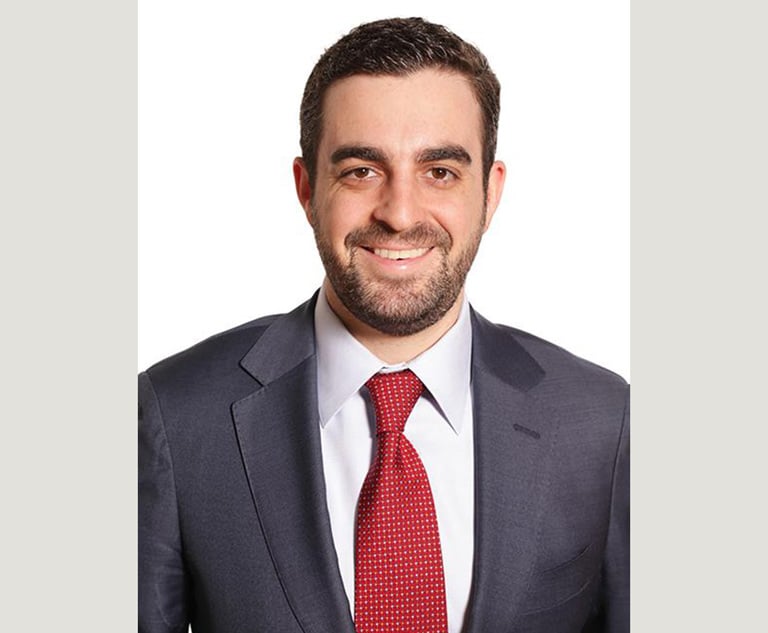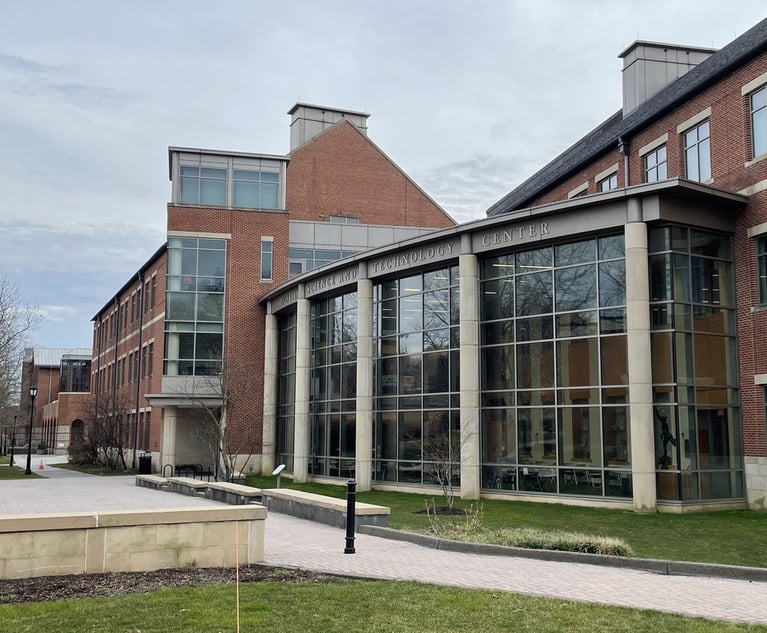 Photo: Shutterstock
Photo: ShutterstockPa. Justices Eye Retroactivity of US Supreme Court Decision on Warrantless Blood Draws
U.S. Supreme Court precedent holding that, absent exigent circumstances, warrantless blood tests are unconstitutional is a substantive rule change and should apply retroactively for any case where the issue was raised on a post-conviction appeal, a defense attorney argued before the Pennsylvania Supreme Court.
April 10, 2019 at 05:38 PM
3 minute read
U.S. Supreme Court precedent holding that, absent exigent circumstances, warrantless blood tests are unconstitutional is a substantive rule change and should apply retroactively for any case where the issue was raised on a post-conviction appeal, a defense attorney argued before the Pennsylvania Supreme Court.
Attorney David T. Leake, of Somerset, Pennsylvania, made the argument Wednesday in the case Commonwealth v. Olson, in which the justices are set to determine whether the U.S. Supreme Court's 2016 decision in Birchfield v. North Dakota should be applied retroactively to cases pending on collateral appeal.
“Birchfield is a substantive rule,” Leake said, and compared the decision to the Supreme Court's 2016 holding in Montgomery v. Louisiana, which retroactively applied its prior decision striking down mandatory life sentences for juveniles as unconstitutional.
Justice David N. Wecht, however, questioned if the two cases were similar.
“That dealt with juveniles as a class,” Wecht said. “This is just guys having too much to drink.”
The arguments in Olson stem from defendant Jeffrey Olson's challenge to the legality of the sentence he received after he pleaded guilty to driving under the influence in 2015. Olson was given an enhanced sentence for refusing to consent to a blood draw, and a few months later the U.S. Supreme Court decided in Birchfield that warrantless blood tests taken pursuant to implied consent laws are an unconstitutional invasion of privacy.
Leake said Birchfield and Montgomery are similar because the high court found that defendants in both cases were subjected to unconstitutional laws.
“It's a class of individuals whose Fourth Amendment rights were violated,” Leake argued.
Chief Justice Thomas Saylor, however, said that, since the law does not categorically bar warrantless blood draws, but instead allows them under exigent circumstances and if the defendant consents, the change was more procedural than Leake was contending.
“It's not categorical. You have work-arounds,” Saylor said.
Leake countered that allowing blood draws under exigent circumstances does not change the Supreme Court's ultimate holding—that the warrantless blood draws at issue were unconstitutional.
“All Birchfield said was that it's illegal,” Leake said.
Deputy Attorney General Hugh Burns, who argued against applying Birchfield retroactively, focused on Saylor's point, and said a matter can only be applied retroactively if it is a substantive change that uncategorically de-criminalizes an issue, rather than a ruling that is simply a procedural change. Burns gave the example of flag burning, and said, once the Supreme Court invalidated laws against flag burning, the state couldn't criminalize it under any circumstances.
“The conduct [in Olson] remains criminal before and after the imposition of the new rule,” he said, adding that law enforcement now just needs to take a few additional steps before performing the blood draw. “That's the kind of rule we have in Birchfield.”
Justice Christine Donohue, however, questioned how the situation wasn't similar to Montgomery, since the holder underlying that case wasn't that life sentences for juveniles were uncategorically unconstitutional, but rather that certain hearings needed to take place before a life sentence was imposed.
Burns replied that in Montgomery, the justices “moved the goal post,” by simply saying it was categorically creating a class of people. The focus of the issue, according to Burns, should be on how the change affects a state's conduct versus and individual's.
“If it all comes down to what the state does, then it's procedural,” Burns said.
This content has been archived. It is available through our partners, LexisNexis® and Bloomberg Law.
To view this content, please continue to their sites.
Not a Lexis Subscriber?
Subscribe Now
Not a Bloomberg Law Subscriber?
Subscribe Now
NOT FOR REPRINT
© 2024 ALM Global, LLC, All Rights Reserved. Request academic re-use from www.copyright.com. All other uses, submit a request to [email protected]. For more information visit Asset & Logo Licensing.
You Might Like
View All
Phila. Jury Hits Sig Sauer With $11M Verdict Over Alleged Gun Defect
3 minute read

Judge Approves $1.15M Settlement, Reduces Attorney Award in COVID-19 Tuition Reimbursement Suit
4 minute read
Dechert 'Spark Tank' Competition Encourages Firmwide Innovation Focus
Trending Stories
- 1Squire Patton Boggs Associate Among Those Killed in String of Methanol Poisonings
- 2Womans Suit Alleging Negligence to Sex Trafficking by Hotel Tossed by Federal Judge
- 3More Big Law Firms Rush to Match Associate Bonuses, While Some Offer Potential for Even More
- 4OpenAI, NYTimes Counsel Quarrel Over Erased OpenAI Training Data
- 5Saying Your Goodbyes—Ethical Obligations When Transitioning to a New Firm
Who Got The Work
Michael G. Bongiorno, Andrew Scott Dulberg and Elizabeth E. Driscoll from Wilmer Cutler Pickering Hale and Dorr have stepped in to represent Symbotic Inc., an A.I.-enabled technology platform that focuses on increasing supply chain efficiency, and other defendants in a pending shareholder derivative lawsuit. The case, filed Oct. 2 in Massachusetts District Court by the Brown Law Firm on behalf of Stephen Austen, accuses certain officers and directors of misleading investors in regard to Symbotic's potential for margin growth by failing to disclose that the company was not equipped to timely deploy its systems or manage expenses through project delays. The case, assigned to U.S. District Judge Nathaniel M. Gorton, is 1:24-cv-12522, Austen v. Cohen et al.
Who Got The Work
Edmund Polubinski and Marie Killmond of Davis Polk & Wardwell have entered appearances for data platform software development company MongoDB and other defendants in a pending shareholder derivative lawsuit. The action, filed Oct. 7 in New York Southern District Court by the Brown Law Firm, accuses the company's directors and/or officers of falsely expressing confidence in the company’s restructuring of its sales incentive plan and downplaying the severity of decreases in its upfront commitments. The case is 1:24-cv-07594, Roy v. Ittycheria et al.
Who Got The Work
Amy O. Bruchs and Kurt F. Ellison of Michael Best & Friedrich have entered appearances for Epic Systems Corp. in a pending employment discrimination lawsuit. The suit was filed Sept. 7 in Wisconsin Western District Court by Levine Eisberner LLC and Siri & Glimstad on behalf of a project manager who claims that he was wrongfully terminated after applying for a religious exemption to the defendant's COVID-19 vaccine mandate. The case, assigned to U.S. Magistrate Judge Anita Marie Boor, is 3:24-cv-00630, Secker, Nathan v. Epic Systems Corporation.
Who Got The Work
David X. Sullivan, Thomas J. Finn and Gregory A. Hall from McCarter & English have entered appearances for Sunrun Installation Services in a pending civil rights lawsuit. The complaint was filed Sept. 4 in Connecticut District Court by attorney Robert M. Berke on behalf of former employee George Edward Steins, who was arrested and charged with employing an unregistered home improvement salesperson. The complaint alleges that had Sunrun informed the Connecticut Department of Consumer Protection that the plaintiff's employment had ended in 2017 and that he no longer held Sunrun's home improvement contractor license, he would not have been hit with charges, which were dismissed in May 2024. The case, assigned to U.S. District Judge Jeffrey A. Meyer, is 3:24-cv-01423, Steins v. Sunrun, Inc. et al.
Who Got The Work
Greenberg Traurig shareholder Joshua L. Raskin has entered an appearance for boohoo.com UK Ltd. in a pending patent infringement lawsuit. The suit, filed Sept. 3 in Texas Eastern District Court by Rozier Hardt McDonough on behalf of Alto Dynamics, asserts five patents related to an online shopping platform. The case, assigned to U.S. District Judge Rodney Gilstrap, is 2:24-cv-00719, Alto Dynamics, LLC v. boohoo.com UK Limited.
Featured Firms
Law Offices of Gary Martin Hays & Associates, P.C.
(470) 294-1674
Law Offices of Mark E. Salomone
(857) 444-6468
Smith & Hassler
(713) 739-1250





